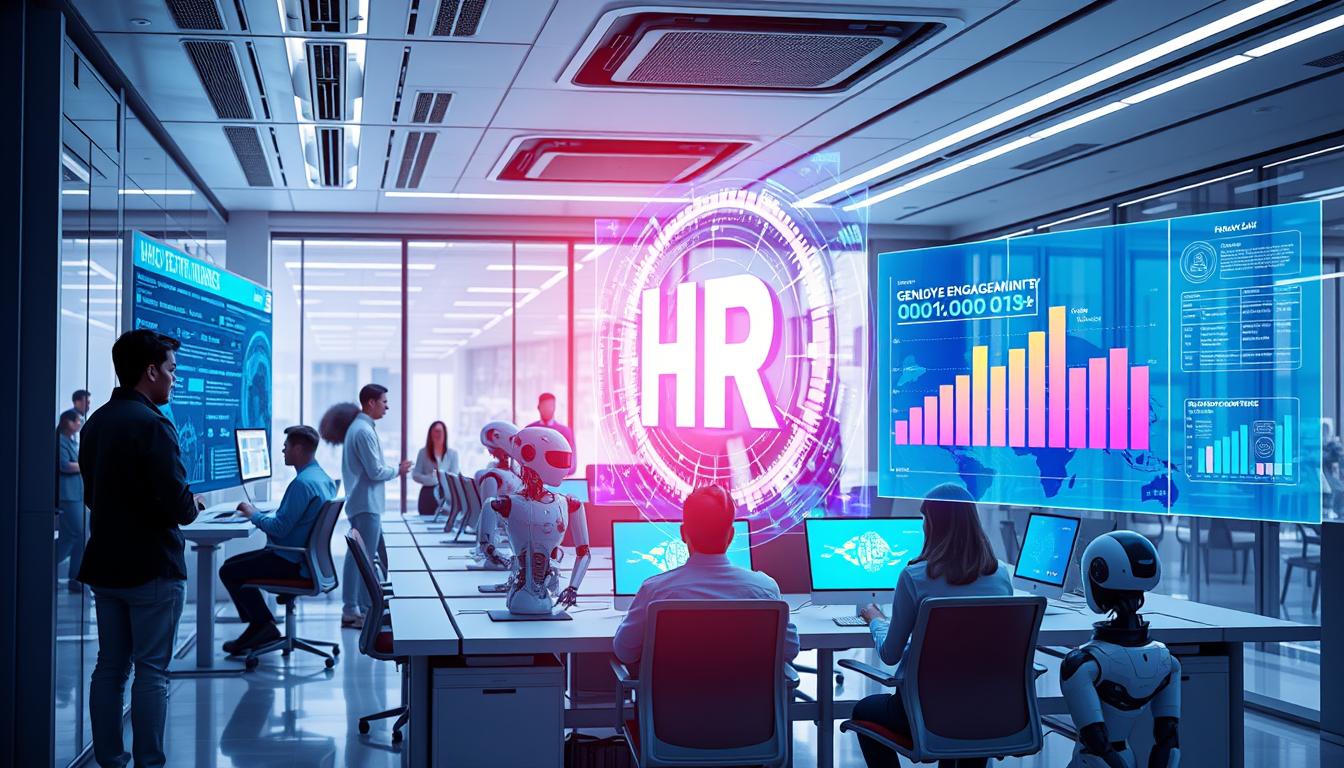Last Updated on December 9, 2025
Generation Z, born from the late 1990s to early 2010s, is now entering the workforce. Their influence on the future of work for Gen Z is becoming more significant. By 2024, they will surpass Baby Boomers in full-time employment, highlighting the need to understand their values and needs.
With talent shortages and economic uncertainties, including inflation and student debt, Gen Z’s priorities are critical. They seek Gen Z career trends that offer meaningful work. This is essential for shaping workplace policies.
Interestingly, 37% of Gen Z individuals consider meaningful work essential. Many also worry about job excitement and career fulfillment. Financial stability and mental wellbeing are major concerns for them, with 55% prioritizing financial security.
With such significant changes on the horizon, it’s vital to explore how Gen Z will shape the workplace. This will be crucial for both now and the future.
Key Takeaways
- 37% of Gen Z value meaningful work above all.
- 55% prioritize financial stability due to economic pressures.
- 62% emphasize the importance of health and wellbeing.
- 73% of employees want permanent flexible work options.
- Gen Z will be 27% of the workforce in OECD countries by 2025.
- 46% of Gen Z report feeling stressed or anxious regularly.
The Rise of Gen Z in the Workforce
Generation Z, born between 1996 and 2010, is quickly becoming a major player in the workforce. By 2024, they are expected to surpass Baby Boomers in full-time roles. This change signals a new era in the Gen Z job market, influenced by their unique experiences and perspectives. Gen Z has grown up with rapid technological advancements, shaping their workplace expectations and professional approach.
Gen Zers are known for their self-agency, seeking answers and questioning traditional methods. They value teamwork, focusing on collective success. Employers must create an environment where open dialogue and consensus-building thrive.
Gen Z prioritizes mental health and work-life balance, demanding flexible work environments. Addressing these Gen Z workplace expectations is key to attracting and retaining talent.
As Gen Zers start their careers, they aim to make a meaningful impact. Companies must align their values with Gen Z’s to foster loyalty and engagement. Trust and authenticity are crucial; Gen Z expects actions to match words, promoting a culture of openness and respect.
Gen Z Future Work: Characteristics and Priorities
Understanding Gen Z’s unique traits and priorities is key to effective recruitment and retention strategies. They value meaningful work highly, as it significantly influences their job satisfaction. Their concerns about financial security also shape their expectations for salary and career stability.
Emphasis on Meaningful Work
Gen Z employees show a clear preference, with 37% prioritizing meaningful work over other job aspects. This reflects their desire to positively impact society through their careers. Companies must showcase alignment with Gen Z’s values to attract them. Initiatives focused on social causes and transparency are particularly appealing to this generation. By addressing Gen Z employment insights, your organization can stand out in the competitive job market.
Financial Security Concerns
Financial stability is a major worry for Gen Z, with 55% concerned about debt and economic uncertainty. They prioritize job stability and comprehensive benefits in their career choices. Despite valuing salary less, they aim for an average income over $170,000 for financial security. Employers can alleviate Gen Z’s concerns by emphasizing robust training and career development opportunities.
Changing Workplace Dynamics
The workforce is undergoing a significant transformation with Gen Z’s arrival. This generation brings fresh perspectives and expectations to the workplace. Companies are now adapting to meet these evolving demands, focusing on flexibility and collaboration.
Flexibility and Remote Work Options
Gen Z values flexibility in their work arrangements. Research indicates that most workers prefer permanent flexible work options. As Gen Z is set to make up almost 30% of the workforce by 2025, businesses must adapt to accommodate remote work and flexible hours.
This generation excels when given the freedom to choose their work environment. It aligns with their active lifestyles and desire for personal autonomy.
Collaboration and Teamwork Expectations
Gen Z also emphasizes the importance of collaboration in the workplace. Their upbringing in a digitally connected world has shaped their teamwork approach. Companies that foster a collaborative atmosphere often see higher engagement from Gen Z employees.
They thrive in environments that promote open communication and teamwork. These factors significantly boost job satisfaction. As organizations aim to engage younger employees, adapting to these dynamics is essential for long-term success.
Mental Health and Wellbeing in the Workplace
Gen Z’s entry into the workforce has highlighted the importance of mental health. This generation faces high stress and anxiety, exacerbated by financial burdens like student loan debt. Approximately 75% of Gen Z college students graduate with debt, affecting their financial security and mental well-being. With 64% believing employers should offer caregiving benefits, companies must address these challenges effectively.
Addressing Mental Health Challenges
Organizations must prioritize mental health initiatives for Gen Z employees. These individuals are more willing to discuss their mental health and seek help. To support them, companies can introduce various programs, such as:
- Meditation apps
- Resilience training
- Educational workshops
- Mental health coaching
- Emotional health podcasts
These tools help foster a supportive culture, aligning with Gen Z’s values. Companies should also work to reduce stigma by creating open environments and integrating mental health policies.
Employers’ Role in Supporting Wellbeing
Employers are key in the mental health landscape. Gen Z employees seek support in areas like mental health, emotional wellness, and financial stability. They value quick access to well-being information and flexible work arrangements. Offering enough time off is crucial for retaining talent.
Aligning with Gen Z’s values can boost productivity. The economic benefits are clear; poor mental health costs the U.S. over $47 billion annually in lost productivity. As Gen Z grows in the workforce, a holistic approach to mental health is vital for success.
Generational Differences: Gen Z vs. Millennials
The workplace is shaped by distinct views between Generation Z and Millennials, especially on work-life balance and job loyalty. With 25% of the U.S. population being Gen Z, their approach significantly impacts the job market. Understanding these differences is crucial for navigating the Gen Z job market effectively.
Work-Life Balance Preferences
Generation Z values a healthy work-life balance above all else. They seek personal fulfillment and flexibility in their careers. This generation prioritizes personal goals over traditional success measures. For them, remote or flexible work is key.
In contrast, Millennials also value flexibility but focus more on career advancement and long-term goals. This difference in priorities shapes their professional lives.
Loyalty and Engagement in the Job Market
Loyalty in the workplace has a new definition for Generation Z. They are shaped by economic shifts and a rapidly changing job scene. They seek meaningful work that matches their values, prioritizing personal fulfillment and job security over employer loyalty.
Millennials, however, are ambitious and willing to switch jobs for better opportunities. They deeply engage with causes they care about, showing a strong commitment to their values.
Impact of Technology on Gen Z Work Preferences
Technology’s rapid advancement significantly influences Gen Z’s work preferences. Born into a digital age, this generation has a distinct relationship with technology. It shapes their career choices and work experiences. This understanding is key to grasping Gen Z’s career trends.
Digital Communication Tools
Gen Z’s comfort with digital tools changes workplace dynamics. They prefer instant messaging over emails, seeking more dynamic communication. Employers must adapt by using user-friendly digital tools. This ensures a work environment that Gen Z finds engaging.
Leveraging Social Media for Career Opportunities
Social media is vital for Gen Z’s career development. They use platforms like LinkedIn and TikTok to network and find jobs. A strong online presence is crucial for job seekers. Employers and Gen Z must navigate the digital job market effectively. Adaptability and innovation are vital in this evolving landscape.
The Demand for Diversity, Equity, and Inclusion
The workforce is undergoing significant changes, with diversity and inclusion becoming crucial. Gen Z, born between the mid-1990s and early 2010s, emphasizes authenticity and equitable practices. Employers must meet Gen Z’s expectations for workplaces that genuinely value these principles.
Gen Z’s Expectations for Inclusive Workplaces
Gen Z seeks more than superficial gestures in an inclusive workplace. They want organizations where diversity and inclusion are integral to operations. This includes leadership representation and marketing strategies. About 83% of Gen Z employees prioritize a company’s commitment to these values when choosing a job.
They expect transparent communication about DEI policies, seeking regular updates and clear paths for improvement.
Corporate Responsibility and Gen Z Values
Gen Z is driven by a desire for corporate responsibility. They admire companies like Patagonia and TOMS for their social impact and ethical practices. This shift requires companies to link their DEI efforts with broader social justice issues.
Companies like Unilever and Microsoft are adapting to Gen Z’s influence, showing that embracing diversity and inclusion boosts employee loyalty and retention. As Gen Z shapes the workplace, companies that prioritize these values will likely see increased employee satisfaction and creativity. This ensures they remain competitive in the rapidly changing market.
Career Growth and Development Opportunities
As you navigate your career journey, you’ll find that career development is a top priority for Generation Z. This generation, now a significant part of the workforce, values continuous learning and personal growth. With traditional salary packages losing appeal, opportunities for skill enhancement and growth are crucial for attracting and retaining talent. Companies that focus on upskilling not only engage Gen Z but also build a robust, capable workforce.
Desire for Learning and Skill Enhancement
Many of you have started your careers during unprecedented times, like the COVID-19 pandemic. The importance of adaptable, meaningful work opportunities is clear. Generation Z looks for environments that support skill enhancement and lifelong learning. Employers can empower you by encouraging personal and professional growth, helping you set and achieve your goals.
The Importance of Clear Promotion Paths
Clear promotion paths within organizations are equally vital. You deserve to know about advancement opportunities, which boosts motivation and a sense of belonging. By creating a culture that shows career trajectories, employers can improve job satisfaction and retention among Gen Z workers. A human-centered approach, including mentorship and structured development programs, leads to a more engaged and satisfied workforce.








